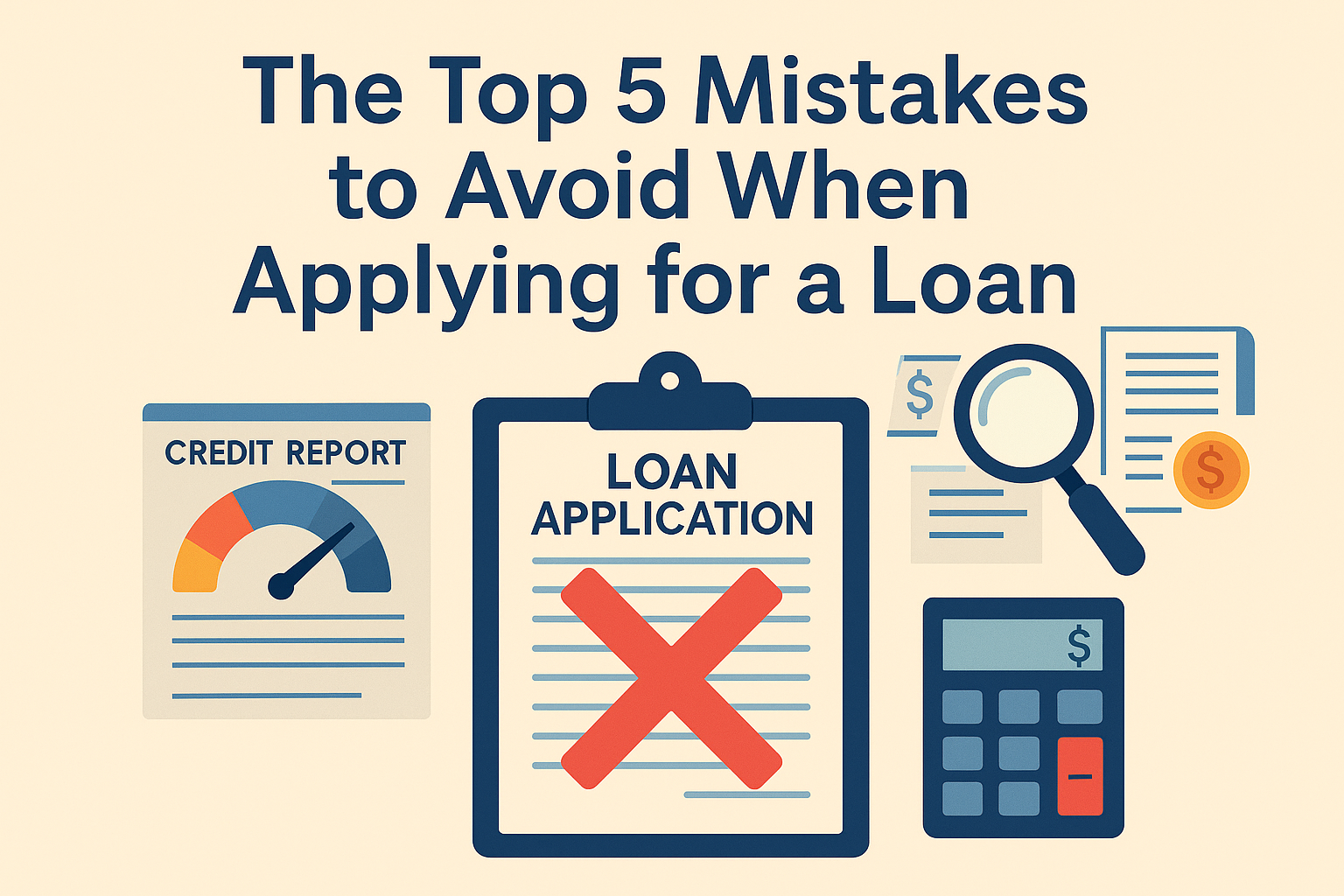It can be both exciting and scary to get a loan. The stakes are high if you want to buy your first home, pay off debt with a personal loan, or get money for a new car. Getting a loan can help you reach your goals, but if you get turned down, it can hurt your credit score and set you back. To give yourself the best chance of success, you should avoid making the same mistakes that a lot of borrowers do.
We’ll talk about the five most common mistakes people make when they apply for a loan, why they happen, and how to avoid them in this article. There are also links to reliable industry resources, real-world examples, and answers to common questions.
Mistake #1: Not Looking at Your Credit Report
Why It Matters
First, lenders check your credit report and score. A score of 700 or higher means you’re a responsible borrower, while a score of 699 or lower raises red flags. Here are some common problems with credit reports:
- Errors or out-of-date information, like accounts that are closed but still show as open
- Payments that you forgot about that were late or missed
- A lot of credit use, like credit cards that are full to the brim
The Consumer Financial Protection Bureau says that one out of every five people sees errors on their credit reports. It is possible to raise scores by 20 to 80 points by fixing these mistakes.
How to avoid making this mistake
- At AnnualCreditReport.com, you can get your reports from all three bureaus: Equifax, Experian, and TransUnion. You can do this for free once a year.
- Look closely for errors or fraud. If you find any errors, you should file a dispute with the bureau right away.
- To deal with real negatives, pay off your debts, set up autopay, and keep your utilization below 30%.
Mistake #2: Asking for More Than One Loan At the same time
Why it matters
Every time you apply for credit, lenders do a “hard inquiry” on your report. A lot of hard inquiries in a short amount of time can:
- Every time you ask about something, your credit score can drop by 5 to 10 points.
- Let lenders know that you’re having money problems, which makes them think you need credit.
How to Avoid Making This Mistake
- Depending on the scoring model, rates can be as low as 14 days and as high as 45 days. Most credit-scoring algorithms will treat more than one request for the same type of loan during this time as one request.
- Instead of filling out full applications, you can prequalify online. A “soft inquiry” like prequalification won’t change your score.
- First, do some research on rates and fees to find the best lenders for you. After that, only apply to the ones you like best.
Mistake #3: Not getting all the paperwork you need.
Why it matters
It could take longer to process your application or even be denied if it doesn’t have all the information it needs. Most of the time, lenders want:
- Identification (like a passport or driver’s license)
- Pay stubs, tax returns, and bank statements are all examples of proof of income.
- Proof of employment (letter from employer with contact information)
- Things like credit card statements and current loan agreements that show how much you owe
According to a Bankrate survey, 43% of people who applied for a loan didn’t have all the paperwork they needed the first time they sent it in.
How to Avoid Making This Mistake
- You can usually find a list of what your lender needs on their website.
- Put digital copies in a safe folder or document-management tool before you scan and organize them.
- Check the deadlines for sending in more paperwork again, and if your lender hasn’t confirmed receipt, follow up.
Mistake #4: Not paying attention to the terms of the loan and any extra fees.
Why it matters:
The Annual Percentage Rate (APR) includes the interest rate and other costs, such as origination, processing, and underwriting fees. You might miss costs like these if you only look at the nominal interest rate:
- Fees for paying early
- Late payment fees
- Costs for applying or running the business
Investopedia says that borrowers who don’t pay attention to APR details could end up paying hundreds or even thousands more over the life of the loan.
How to Avoid This Mistake
- Check both the APR and the interest rates.
- Get an estimate for your loan (lenders have to give you one for mortgages and big loans).
- Read the fine print; your loan agreement should spell out all the fees.
Mistake #5: Believing you can pay back more than you can.
Why it matters
If you borrow more than you can easily pay back, you might not be able to pay it back, which could hurt your credit and make your finances worse. When deciding whether to give you a loan, lenders often look at your debt-to-income (DTI) ratio. However, these numbers don’t take into account your lifestyle, emergencies, or plans for the future.
A DTI of less than 36% is usually safe, but it depends on the person:
- Costs that come up out of nowhere, like car repairs or medical bills
- Income that changes, like when you work as a freelancer or get paid by commission
- Life changes, like getting married, having a baby, or moving
How to avoid making this mistake
- Make a budget that includes your basic living costs and a buffer of 10% to 20%.
- Use loan calculators to find out how much you will have to pay each month at different interest rates.
- Try to keep your DTI below 30% if you want to have more money in your budget.
- Set up or keep an emergency fund that can cover three to six months’ worth of expenses. This will help you prepare for the unexpected.
Questions That Are Often Asked (FAQs)
Q1: How many hard inquiries are too many? Having more than two or three hard inquiries in a six-month period can make your credit score go down a lot. Most scoring models, on the other hand, only count one inquiry for rate-shopping for a single loan (like a mortgage) over a two-week period.
Q2: Can you apply if you have bad credit? Yes, but the rates will be higher and the conditions will be stricter. Before you apply, think about how to improve your score by paying your bills on time, paying off debt, and disputing mistakes.
Q3: What documents do you need to get a loan? You will usually need a government-issued ID, proof of income (like pay stubs or tax returns), bank statements, proof of address (like utility bills), and your Social Security number.
Q4: Does being prequalified mean you will get approved? Not at all. Prequalification gives an estimate based on soft inquiries and the information people give about themselves. You still have to fill out a full application, which includes a hard inquiry and proof of your identity, to get final approval.
Q5: How can I best compare loan offers? Look at the APR, the total cost of the loan over its term, how flexible the repayment terms are, and all the fees that come with it. Use comparison tools or spreadsheets to put offers next to each other.
Finally,
You will have a much better chance of getting a loan on good terms if you don’t make these five common mistakes: forgetting to check your credit report, applying for too many loans, not sending in all the paperwork, ignoring APR and fees, and borrowing too much. You show lenders that you are a low-risk borrower by checking your credit often, researching lenders, keeping your paperwork in order, carefully looking over loan estimates, and making a budget.
Remember that just getting a “yes” doesn’t mean you’re a good borrower. You should get the most value for your money. Use the tools and plans on this page to apply with confidence and care.
References
- Consumer Financial Protection Bureau. “2021 Consumer Credit Reports: Findings & Data.” CFPB, 2022. https://www.consumerfinance.gov/data-research/research-reports/consumer-credit-reports-2021-findings/
- AnnualCreditReport.com. “Your Free Credit Reports.” AnnualCreditReport.com. https://www.annualcreditreport.com/index.action
- Fair Isaac Corporation. “FICO Score Factors: How Your Credit History Impacts Your Score.” FICO, 2024. https://www.myfico.com/credit-education/credit-scores
- Bankrate. “2024 Borrower Behavior Survey.” Bankrate, January 2025. https://www.bankrate.com/personal-finance/loan-borrowing-statistics/
- Investopedia. “APR vs. Interest Rate: What’s the Difference?” Investopedia, March 2025. https://www.investopedia.com/terms/a/apr.asp






